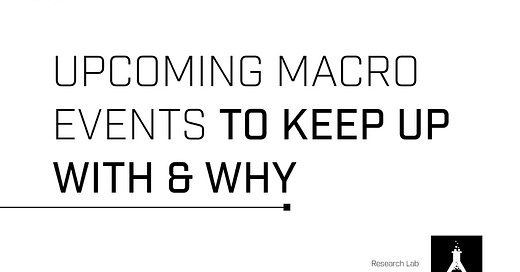Upcoming macro events to keep up with & why
Knowing when important events are coming up and what they could mean for markets is essential. In this thread, we will cover notable upcoming events and why they're significant.
The macro economy is the monolith standing tall above financial markets, and we must consider it when making market decisions. Knowing when important events are coming up and what they could mean for markets is essential. In this thread, we will cover notable upcoming events and why they're significant.
Nov 2nd - FOMC
The second to last Federal Open Market Committee (FOMC) will be critical for investors. The Federal Reserve has been increasing interest rates for several months, but inflation hasn’t decreased significantly.
This is important in considering how the Fed will react to inflation data. The PCE price index was up 0.3% month-over-month in September, which is in line with expectations. This could be a good sign regarding the efficacy of previous rate hikes. Expectations for this meeting are a 0.75% increase in interest rates to make the rate = 3.75 - 4%. Markets tend to have whiplash volatility on this news, so expect that to come.
Nov 4th - NFP, UNEMPLOYMENT RATE
Non-farm payrolls (NFP) - the change in the number of employed people in the economy (excluding farming). NFP indicates the level of consumer spending (more employed = more spending), which is a large part of economic health. An increase in this measure can mean increasing inflation - increased spending = increased demand.
When we see businesses hiring more, it can often indicate success; however, the double-edged sword comes into play when sellers react by raising prices due to business expansion. Although it may sound harsh, we want this measure to fall in the current macro state as it shows that monetary policy actions are impactful.
Unemployment rate - This measures how many people in an economy are not at work. This is the same as NFP regarding what it can show us about demand and inflation.
Nov 5th - OPEC Meetings
The Organization of Petroleum Exporting Countries (OPEC) regulates the oil supply, provides price stability for oil, and controls price movement. At the beginning of October, OPEC cut oil production by 2 million barrels per day, intending to combat rising interest rates and a weakening global economy.
However, most believed this was purely a decision to drive prices upward. Oil prices impact inflation with its influence on energy prices, so this meeting will be vital to watch for any decisions which may worsen or improve inflation.
Nov 8th - Congressional Elections (Midterm Elections)
Federal offices are up for election, which includes all 435 seats in the United States House of Representatives and 33 or 34 of the 100 seats in the United States Senate.
This is highly impactful on markets as new federal electees mean new/innovating policy, which scares investors, so the markets will react based on who wins certain positions. Tip: have a look at the candidates and their ideals.
Nov 10th - CPI
The Consumer Price Index measures the overall change in consumer prices based on a representative basket of goods and services over time. CPI is currently at 8.2% year-over-year, so we need a decrease from this benchmark for a positive market reaction.
The result will spur volatility heavily as the market tries to price, in effect, forward-looking at FOMC in December.
You can keep yourself updated further using an economic calendar like Forex Factory.
Subscribe to receive our daily brief, extended weekly newsletter, and in-house research content!
Please Share, Leave Feedback, and Follow Us on Twitter, Telegram, and LinkedIn to stay connected with us.




